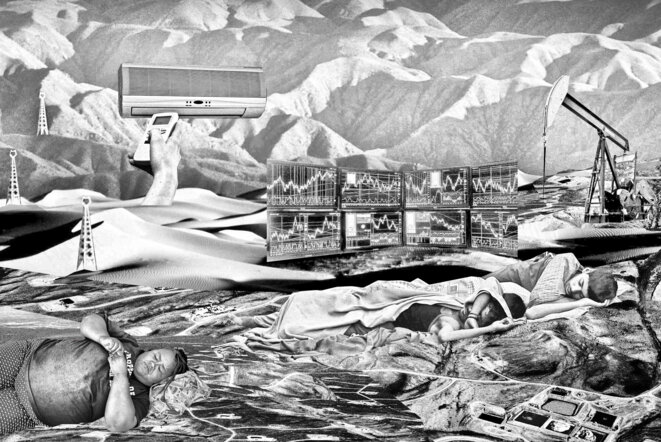
Blog suivi par 8 abonnés
Le blog de Berliner Gazette

À propos du blog
Berliner Gazette (BG) is a nonprofit and nonpartisan team of journalists, researchers, artists, and coders, experimenting with and analyzing emerging cultural and political practices. Since 1999 we have1…
been publishing berlinergazette.de under a Creative Commons License with more than 1,000 contributors. In dialogue with our international network we create annual projects, exploring the issues at hand not only in the form of text series but also conferences and books. Our latest projects include "Black Box East" (2021), "Silent Works" (2020), "More World" (2019), "Ambient Revolts" (2018), "Signals" (2017), "A Field Guide to the Snowden Files" (2017), "Friendly Fire" (2017), "Tacit Futures" (2016), "UN|COMMONS" (2015), "BQV" (2012), and "McDeutsch" (2006).
-
The Deadly Logics Of Capital In The Vicious Economic-Ecological Cycle
 The economic and ecological crises of capital have long been intertwined. This can be seen not least in the heat-induced mass deaths among poor and vulnerable sections of the population – and not only in the Global South, as Tomasz Konicz argues in his contribution to the BG text series “After Extractivism.”
The economic and ecological crises of capital have long been intertwined. This can be seen not least in the heat-induced mass deaths among poor and vulnerable sections of the population – and not only in the Global South, as Tomasz Konicz argues in his contribution to the BG text series “After Extractivism.” -
Against the Depoliticizing of Environmental Struggles: Notes On Non-Reformist Reforms
 Struggling within the vicious circle of the ecological-economic complex shows: There is an inherent contradiction to working within systems to counter the injustices and damages they cause. We can learn from carceral abolitionists in the U.S. to counter this dilemma with “non-reformist reforms,” as J. Mijin Cha argues in her contribution to the BG text series “After Extractivism.”
Struggling within the vicious circle of the ecological-economic complex shows: There is an inherent contradiction to working within systems to counter the injustices and damages they cause. We can learn from carceral abolitionists in the U.S. to counter this dilemma with “non-reformist reforms,” as J. Mijin Cha argues in her contribution to the BG text series “After Extractivism.” -
Somewhere Is Always Connected to Elsewhere: Towards a Politics of Relationality
The dispossessed are socially fragmented, geographically dispersed, and speak many languages. In order to fight against the capitalist regime of political and economic dispossession, therefore, a concept of alternatives is needed that renders this multiplicity productive, as Agata Lisiak argues in her contribution to the BG text series “After Extractivism,” exploring a politics of relationality. -
No Cheaps Here, Not Anywhere: After Extractivism in a Semi-Periphery
 Studying the history of the exploitation of both labor and environment in the Balkans reveals an enormous scale of destruction and dispossession. Yet even where the machinery of extractivism seems to operate as a totalizing system, resistance from below continues to emerge, as mirko nikolić shows in his contribution to the BG text series “After Extractivism” exploring the case of Serbia.
Studying the history of the exploitation of both labor and environment in the Balkans reveals an enormous scale of destruction and dispossession. Yet even where the machinery of extractivism seems to operate as a totalizing system, resistance from below continues to emerge, as mirko nikolić shows in his contribution to the BG text series “After Extractivism” exploring the case of Serbia. -
How Can We Overcome Ideological Resistance to System Change?
The ideology of right-wing populist resistance against the energy transition – as manifested in climate change denial – should be examined closely if one wants to penetrate the causes of a general social inability, far beyond the ranks of the right, to tackle the necessary transformation of the capitalist system, Tatjana Söding argues in her contribution to the BG text series “After Extractivism.” -
How The Violence Of “Green” Extractivism Enforces Sedentism In Nomadic Mongolia
In the age of green capitalism copper is the “new oil.” Since Mongolia has plenty of it, its ruling class has initiated a violent transition that brings to the fore the precarious existence of nomads – and thus serves a starting point for common struggles against the economic-ecological complex, as Shuree Sarantuya shows in her text to the BG series “After Extractivism.” -
Reconfiguring Resistance: Acts of Worldmaking and Aesthetics of Extractive Solidarity
From the very beginning, anti-capitalist struggles in the Global South have been accompanied by the question of how the experience of exploitation, shared across borders, can be turned into shared politics of resistance and emancipation. Impulses for this can be found not least in artistic contributions, as Christine Okoth argues in her contribution to the BG text series “After Extractivism.” -
“No Future”-Futures: How to Turn the End of the World Into an Emancipatory Project
Facing climate catastrophe, it is time to question everything that has led us to this point, not least the prevailing systems in which we organize and think production. Because they have been exposed as useless, even catastrophic, both capitalism and the rationalities of progress must be replaced by alternatives, Lukas Stolz argues in his contribution to the BG text series “After Extractivism.” -
The Same Old European Deal: Countering the Myth of Green Capitalism in Bulgaria
The “green” transition opens new spaces for accumulation. The cost of this is to be borne by society, especially by workers in old industries. Thus, the question here is not simply how to start the post-carbon era, but rather how to advance post-capitalism, as Stoyo Tetevenski argues in his contribution to the BG text series “After Extractivism” by tackling the coal question in Bulgaria. -
What Should We Put in Place of the Exhausted Dreams of Demagogues and Investors?
The transition into a better world requires fundamental changes: economic, political, technological, and epistemic. But it also requires new dreams which make transition justice a no-brainer, as researchers Sanja Bojanic and Marko Luka Zubcic argue in their contribution to the BG text series “After Extractivism,” unravelling the sell out of Kvarner Bay in Croatia.
- Page précédente
- 1
- 2
- 3
- 4
- 5
- 6
- …
- 9
- Page suivante


